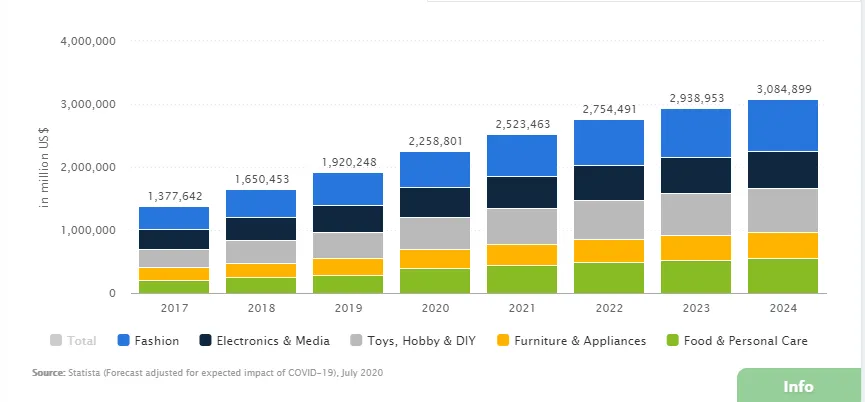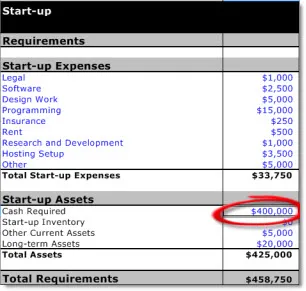After working on a cool business idea, the prime question arises, “How much will an eCommerce website cost?” Answering this question can be very tricky. Some eCommerce businesses can be started on a small budget, while it’s not the same for all. It is essential to know how much money is required to open and operate an eCommerce business to keep it running smoothly. Forecasting eCommerce startup costs is one of the most critical pre-startup tasks that can give an idea to the owner about the future of their eCommerce website.
For example, when Facebook started, Zuckerberg spent $3000 every month for its hosting, and after 4 years, this expense rose to $10 million. As a startup grows, it’s expenses also grow, that makes the forecasting of eCommerce startup costs a necessary aspect for the business.
Revenue in the eCommerce business is predicted to grow $2,258,801 million by 2020.

20 Tips to estimate your eCommerce Startup Costs:
Measuring or calculating eCommerce startup costs can be performed using predictive analysis. If we consider some aspects, then this task can be simplified. Elements that influence the cost of an eCommerce business:
- Resource & Equipment Required
- Hiring Developers or Software Outsourcing Firm
- Availing Certificates, License, & Permits for Your Startup
- Opting for Online Transaction or Integrated Payment Gateway
- Marketing & Advertising
- Asset Maintenance
- Insurance of liabilities
- Rent for Storage
- Research & Development
Here are 20 cost estimation tips for your eCommerce startup that may help you with your journey:
1) Every eCommerce business requires a working space where team members can work and collaborate. Think about the money that you need to pay for the rent or the renovation of the space.
Rent of your working space is a big cost, and it will help you to research and forecast your overall future eCommerce business cost!
2) You should consider the website production cost in case of a product based eCommerce business. It depends upon various factors of the web site, like the total number of pages, style of design, page copywriting, responsive design, database integration, eCommerce functionality, CMS, etc.
Read More: A Comprehensive Guide To Create An Ecommerce App From Scratch
3) The presence of technology makes the business more productive. Compute the expense of computers, telephones, and copiers that you might need for your startup.
Calculating the IT budget can help you to recognize the total amount that your back-office systems, ERP applications, hardware expenses; laptops bills, mobile devices, routers, servers, and other networking equipment will take.
Build an eCommerce website to upcsale your business!
4) Figure out the salaries with the benefits that you’ll offer to your employees. That’s a major part of an eCommerce startup plan.
The proper salaries and wages of your early employees can easily be determined by asking yourself some simple questions:
What is the current budget?
What’s the competitive market wage for a particular position?
What valuation does your business have?
Do you have your investors on-board?
What is the motivation factor for your early hires?
5) Ecommerce businesses always have to ship the products to their customers, so your e-commerce startup should essentially add packaging and shipping costs. However, if you use a print-on-demand dropshipping partner, they handle logistics and manufacturing, allowing you to focus solely on sales.
Even after providing a great customer experience, it is required to find a goods shipping partner. The shipping cost depends upon Package Size, Package Weight, Origin Country, and Destination Country. It can also include the insurance and tracking options for your products.
And, after all the above factors, packaging & labeling should also be included.
So be it DHL, FedEx, or UPS, choose your shipping partner wisely!
Related blog: HOW DID WE CREATE AN ECOMMERCE WEB SOLUTION IN JUST 3 DAYS?
6) Transforming your innovative idea into a growing company is a great way. To enhance the safety of products and your business, insurance offers the right protection. Keep an account of insurance against property damage, business interruption, for better budgeting while making your eCommerce startup plan.
Insurance not only provides liability coverage, but it also offers property protection, protection for product damages, employee protection, and E&O coverage.
7) Don’t forget to add overtime pay and payroll related taxes to your budget. This will help you determine the budget for salary and overtime, and it will control this expense by adding the total costs associated with salary.
So, calculate the total overtime hours that you expect from a certain position. These hours will be based on the projected sales figures and production inclinations. Calculate the hourly overtime pay for all positions and combine the payroll taxes with this number.
8) Marketing and advertisements are necessary for the growth of an eCommerce business. Calculate the required expense for advertising your eCommerce website to the right set of people.
Advertising cost is the discretionary fixed cost that’s spending can be changed from one budget period to the next budget period. You can ask yourself below questions to better budget marketing and advertising expenses:
What are your marketing goals for the next quarter?
What should be the budget for your SEO & PPC campaigns?
How much should you spend on TV and print advertising?
How much does a purchase intend to your organization?
Do you want to grow local or international?
Top 10 eCommerce Marketing Strategies [Must Watch]
9) While calculating your eCommerce startup costs, make sure you count utilities and other expenses, the most overlooked charges.
Calculate all the charges for utilities like water, electricity, cooling or heating, etc. for a given time period.
One more thing to remember is that you should list the total amount of utilities as selling expenses that are used in order to help a company sell goods and/or services.
10) Attorney’s advice is necessary to stay abreast of the legal issues of the business. Take care of the attorney’s and consultant’s costs. This cost will help you to remain updated with the current compliance requirements and stay away from the violation of industry standards and compliances.
Thes business lawyer cost can vary as per the location and the lawyer’s experience.
11) Consider the expenses for getting permits and licenses related to your business. There are certain factors that affect the requirement of permits and business license:
City
Country
State
Products you sell
HirIng employees or WFH
Whenever you take a license, note down the expiration date of that license. Renew your license prior to their expiry date.
12) One of the primary eCommerce website costs comes from an internet connection. Add the estimated cost of monthly internet charges and other software applications.
The price of your internet connection depends upon the type of connection like DSL, fiber, or cable that you opt for and other special features like leased line, and what speed you want.
If you combine your internet connection with your home connection then it will cost you less.
13) If you took some loan for a fluid financial stream, then you should also include the eligible interest on your budget.
14) Separate recurring costs and one-time costs. This helps in establishing the budget after the launch of your startup.
The recurring cost includes various things like an estimated number of products, domain, business email, and SSL certificate, whereas one-time cost could be designing, customization, adding products, and data.
These costs can vary for hobby/startup, small business, and growing retail Enterprise.
15) Every business needs a website maintenance service for it. Interpret such costs and add them to your list.
The cost of maintenance depends upon the type of business you own. But, here we are talking about a customized eCommerce business so the design and performance of your eCommerce platform should be specifically optimized for high visitor engagement and good interaction.
Must Watch: 13 Must-have Features for eCommerce Website
16) Identify the expenditure in business cards and other stationery stuff, like notepads and pens, etc.
Stationary can help your business in many ways like doing networking to working as a marketing tool. So try to uniquely customize your business stationery to give your business professionalism and do add the expenditure to your business cost.
Related: Top 10 Ecommerce Platforms
17) Products based eCommerce businesses need raw material for the production of their goods. Including the number of raw materials and their transportation charges can also be beneficial in forecasting your eCommerce startup costs.
So, calculate each and every penny that you spend on the raw material for your goods or services and also the transportation charges that you pay.
18) If you opt to accept credit cards for your business, then do take account of their fees. They can be expensive.
⅓ rd of the consumers hang back on online transactions due to security concerns. Find a secure and renowned payment gateway and don’t forget to add the expense for a merchant account and payment gateway.
Build an eCommerce website to upcsale your business!
19) Recruitment costs are a major concern for employers. One should not underestimate the recruitment cost and should consider while calculating total costs.
Before estimating the cost of recruiting, go through the below steps:
CALCULATE THE EXPENDITURE ON JOB ADVERTISEMENTS, PROMOTIONS, REFERRALS, OR RECRUITMENT AGENCIES.
COST ESTIMATION FOR LOGISTIC SUPPORT DURING HIRING, AND RELOCATIONS.
DETERMINE THE COST OF THE RECRUITMENT PANEL OR RECRUITERS.
Related blog: How To Hire The Best Indian Software Developers?
20) Often, while starting a business, owners forget to take care of surety bonds until they realize it’s significance midway through the licensing process. Make sure to fill out surety bonds and add up their fees too.
Here is a cheat sheet that will give you an idea of your eCommerce startup costs planner.
In a nutshell:
Starting a business is a challenge in itself. An eCommerce website cost along with operational expenses is high in the initial stages and it takes a toll on the owner. The beginning process of an eCommerce website can be both time consuming and overwhelming.
It requires a great amount of hard work and research. While robust efforts are required for business success, one also needs capital strength to get started, making the determination of startup cost an essential endeavor. We hope the above discussed 20 tips for eCommerce startup costs will help you largely to estimate the overall cost of your business.
If you are planning for an eCommerce business, let’s lay the foundation to develop an interactive website. ValueCoders is one of the top Outsourcing Companies adept with all the modern CMS platforms like Magento, WooCommerce, PrestaShop, osCommerce, etc. Also, our Mobile Application Development Services are preferred by global clients. Hiring Dedicated Development Teams for retail & eCommerce development from us will not only help you save cost but also give a professional touch to your eCommerce website. You may Contact Us Here.
Frequently Asked Questions:
What does it cost to develop an eCommerce website?
The cost of an eCommerce website depends upon multiple aspects like hosting, licensing, designing, custom development, the number of pages, style of design, page copywriting, responsive design, database integration, eCommerce functionality, CMS, configuration, training, and maintenance.
Cost of eCommerce website development also depends upon the type of business and eCommerce solution. Like if you are a business who wants a SaaS website then it could roughly cost around $2000 – $3000, and if you want a traditional eCommerce website then it could range from $10000 – $80000.
What does eCommerce website maintenance cost?
There is no such standard cost for maintenance. But for reference, the average eCommerce website maintenance cost can vary between $35 – $5000. This cost depends upon the type of business and website that you own.
How to calculate shipping cost?
After checking out, the online stores add a shipping cost to the final amount. Some sites offer free shipping and some ask for the delivery or shipping charges. But the cost of shipping can be calculated by looking at the applicable charges of your business shipping partner.
Most of the shipping partners generate the cost on some basic factors like the weight of the package, its size or dimensions, city, state, country, product type, tracking option, etc.
If you are planning to ship internationally then it could require multiple shipping methods and can cost a little higher than usual.
What does an eCommerce business plan include?
To help you set translucent goals and create an action plan to achieve success, a business plan will be beneficial.
You can take help from the below plan to draw an outline for your eCommerce business:
- Company Summary: Create an overview of all business requirement
- Products & Services: Outline your products, inventory, and packaging
- Analysis: Analyse current market, competitors, and trends
- Strategy & Implementation: Create a strategy and implement your plan
- Marketing Strategy: Find your target and plan your market strategy
- Web Development: Form web development strategy and determine requirements
- Financial Planning: Include all financial information and describe the budget
- Management Team: Summarize employee KRAs, values, and costs
- Exit Planning: Exit should be just planned like your start
What are the top companies to develop an eCommerce website?
These are some of the top eCommerce development companies to consider for building eCommerce websites:
- ValueCoders
- PixelCrayons
- MentorMate
- Monterail
- Appinventiv






